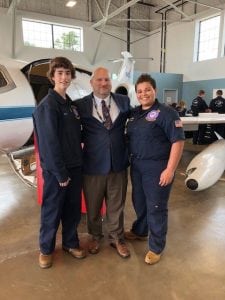DESE Commissioner wants elementary students in school full time in April
WESTFIELD – Elementary school students could be back to school in person full time as early as April if Department of Elementary and Secondary Education Commissioner Jeffrey Riley has his way.
Riley announced his intentions during Gov. Charlie Baker’s Feb. 23 press conference and said he wants older students to also return in-person once elementary students return.

DESE Commissioner Jeffrey C. Riley during a past visit to Westfield Technical Academy with former students Zachary Smith and Faith Young. (SUSAN DARGIE PHOTO)
Riley also hopes that the DESE board will grant him the authority to “decide when hybrid and remote learning models no longer count for learning hours.”
Riley cited the decline in new COVID-19 cases, vaccine rollout and pool testing opportunities at schools to support his decision.
There are several schools piloting a pool testing program now and Riley and Baker said it is working well and could be implemented across the Commonwealth. Baker said rapid testing for both staff and students could be implemented and noted that personal protective equipment as well as air purifiers are among the tools DESE has provided districts.
Riley said if granted the authority, he would consider a phased-in approach and said, for example, a district that has been fully remote since last March could start by taking a hybrid approach. He said families who chose fully remote learning could continue that model through the end of the school year.
Baker said it was time to get students into school buildings.
“With COVID cases and hospitalizations continuing to decline and vaccines well underway, it is time to set our sights on eliminating remote learning by April, starting with elementary schools,” Baker said.
Westfield Public Schools Superintendent Stefan Czaporowski said he agreed students should be in school.
“All students really need to be in school every day, but I certainly appreciate the phased in approach,” he said. “Westfield Schools would welcome this, and we will be prepared should it come to fruition.”
Implementing this, however, could be a challenge.
“Our struggle to meet the six feet physical distancing guidance from the CDC does continue,” he said. “We may be able to do it in some schools, but others will be a challenge. Abner Gibbs is an example because the classrooms are quite a bit smaller than other schools in the district. It is my hope that the 6-foot requirement will also be relaxed otherwise we will need to add several more lunch periods in order to feed our students and utilize our cafeteria space accordingly.”
Riley said DESE recommends “three to six feet” of distance between students. The World Health Organization also recommends three feet, while Massachusetts guidelines call for six feet of distance for the public.
Czaporowski said returning to school in person is the ideal situation for most students.
“This will certainly benefit our students socially, emotionally, and academically,” he said. “COVID restrictions have affected all of us, but especially our younger students who need to socialize and interact with their peers as part of the learning process. We also have to recognize that Commissioner Riley indicated that remote learning will still be an option for the remainder of the school year. While the vast majority of our families want a return to in-person learning, some students are thriving in the remote learning environment.”
Following the announcement Tuesday, the Massachusetts Association of School Committees released the following statement:
“The Massachusetts Association of School Committees has been supportive of getting students back in class as soon as possible. Local school committees and superintendents have been working very hard to make this possible. We remain mindful that, while most parents are eager to see their children return to in-person instruction, there remain questions of immunization, overall school safety and budget that need to be resolved.
“These decisions should remain in the hands of the people who are overseeing individual schools and school districts: school superintendents and school committees in consultation with parents and community members.
We are also concerned that students not be rushed back to in-person classes in order to expedite high-stakes testing and enforcing standards of accountability that would be based on learning acquired during a severely disrupted school year.
“In the meantime, we hope to work with DESE and Commissioner Riley to provide a reasonable framework for getting students back to school in a way that is expeditious and inspires confidence that the decisions are made in the interests of safety of students and school personnel.”






